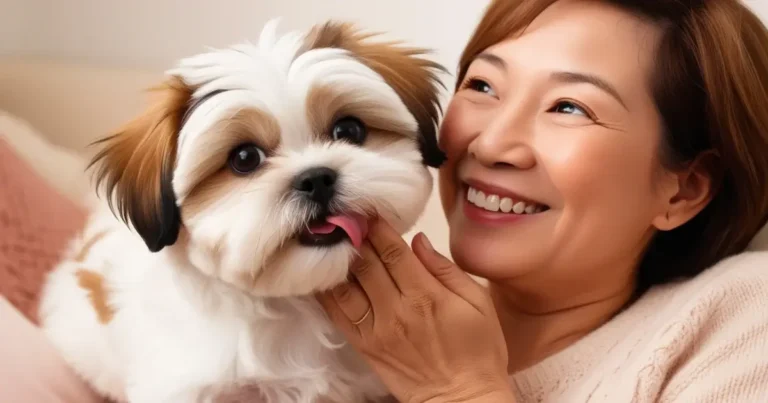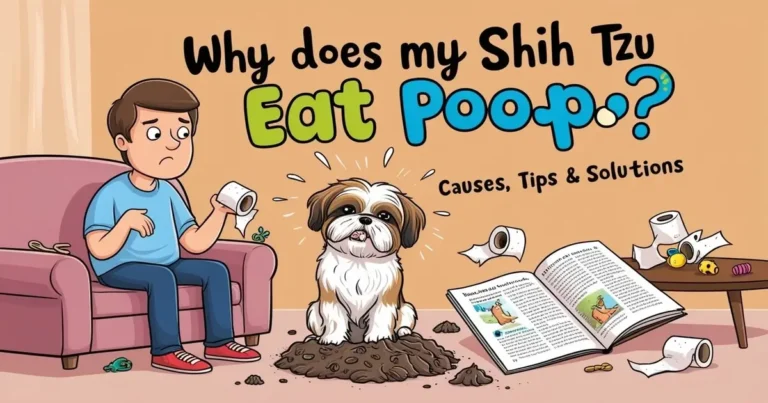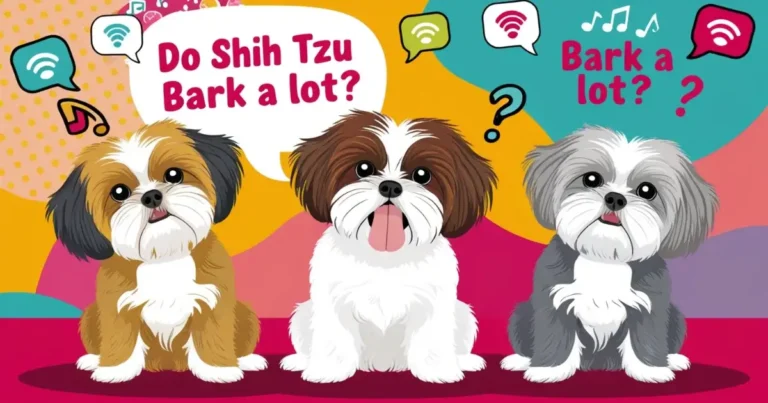Why Does My Shih Tzu Stare at Me? Comprehensive Guide
Shih Tzus are known for their expressive eyes and charming personalities. Their habit of staring often raises questions. “Why does my Shih Tzu stare at me?” is a common query among owners. This behavior isn’t random. It reflects their emotions, needs, and connection with you. Understanding these stares can strengthen your bond and improve communication with your pet.
Table of Contents
Understanding Shih Tzu Behavior Through Their Gaze
Shih Tzu Stare: A Way to Communicate
Shih Tzus use stares to communicate. Eye contact is their way of expressing feelings and building trust. This connection releases oxytocin, a hormone that enhances bonding. When your Shih Tzu gazes at you, they’re creating a moment of closeness.

When They Want Attention
A Shih Tzu stare often signals they need something. They might want food, playtime, or just to be noticed. Their expressive eyes are a way to draw you in and get a response.
Top Reasons Why Your Shih Tzu Stares at You
Expressing Love and Trust
Shih Tzus stare to show affection. These loving gazes are like silent declarations of their bond with you. Studies show mutual gazing between dogs and humans increases oxytocin levels.
Watching Your Actions
Shih Tzus are observant. They stare to understand what you’re doing or planning. Are you reaching for their leash? Preparing their meal? They use their gaze to predict your next move and stay ready for action.
Processing Unfamiliar Situations
Sometimes, a stare reflects curiosity. If you’re doing something unusual, like moving furniture or unpacking a bag, they’re trying to process what’s happening.
Communicating Needs
When your Shih Tzu stares, they might be asking for something:
- If it’s near mealtime, they could be hungry.
- If they’re near the door, they might need a bathroom break.
- If they bring you a toy, they want to play.
Their stare is often paired with actions like pawing or barking to emphasize their point.
What Should You Do When Your Shih Tzu Stares at You?
Read Their Body Language
A stare doesn’t tell the whole story. Observe their posture, tail, and ears for clues. Relaxed body language usually means affection or curiosity. Tense muscles or pacing might signal discomfort.
Respond to Their Needs
If your Shih Tzu is staring, they expect a response. Fulfill their requests if reasonable. Feed them if they’re hungry. Take them outside if needed. If they want attention, spend a few moments with them.
Improve Communication Through Training
Training can make communication easier. Teach commands like “watch me” to guide their focus. Use positive reinforcement to reward good behavior. Training strengthens your bond and reduces confusion.
When to Worry About Staring Behavior
Signs of Anxiety or Stress
If your Shih Tzu stares excessively and seems nervous, they could be anxious. Look for pacing, whining, or hiding. Address the source of their stress and provide comfort.
Health-Related Concerns
Sometimes, staring can indicate health issues. Older Shih Tzus might stare due to cognitive dysfunction. If staring is paired with other unusual behaviors, consult a vet to rule out medical problems.
Aggression Signals
A hard, unblinking stare combined with stiffness could mean discomfort or aggression. Avoid direct eye contact in such cases. Give them space and consult a professional if the behavior persists.

How to Strengthen Your Bond with Your Shih Tzu
Use Positive Reinforcement
Reward your Shih Tzu for good behavior. Treats, praise, and affection encourage them to repeat positive actions.
Spend Quality Time
Daily activities like walks, play sessions, and training keep them happy and engaged. These moments also deepen your relationship.
Conclusion
Understanding your Shih Tzu’s stares unlocks a new level of communication. Whether it’s a loving gaze, a request, or an observation, their behavior reflects their connection with you. By responding thoughtfully and meeting their needs, you can nurture this bond further.
FAQs
How do I know if my Shih Tzu's stare means they’re unwell?
If their staring is paired with lethargy, confusion, or changes in behavior, it may indicate a health issue. Consult your vet for proper evaluation.
Can training help reduce excessive staring in Shih Tzus?
Yes, training with commands like “watch me” can help guide their focus and reduce unnecessary staring. Positive reinforcement ensures better communication and understanding.
Is it normal for Shih Tzus to stare while eating?
Yes, they might watch you while eating to feel secure or seek approval. It’s their way of checking in with you during a vulnerable moment.
What should I do if my Shih Tzu stares aggressively?
Avoid direct eye contact and give them space. Aggressive stares can indicate discomfort. Seek guidance from a professional trainer or behaviorist to address the issue.







